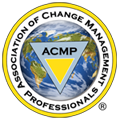by Leslie Fast, Lisa Kempton, and Kelli Fitzmaurice
On Feb 28th, Kelli Fitzmaurice, Lisa Kempton and Leslie Fast hosted a sold-out ACMP Vancouver Happy Hour Change Chat at the Earl’s Test Kitchen in Vancouver to share and discuss insights on defining, monitoring and measuring change success. All participants contributed to an engaging conversation that underscored the importance of clarifying and aligning our change effort to drive towards a shared vision of success.
We facilitated small group discussions on three topics: (1) Defining Change Success, (2) Monitoring & Measuring Success, and (3) Advanced Measurement and Reporting. Below are the highlights from each discussion:
Defining Change Success
Even though it was recognized that change contexts and initiatives vary significantly, participants shared that it’s ideal to:
- Begin to define change success as early as possible, ideally when the Change Strategy is developed
- Engage Sponsors and Project Team Members in defining success to increase alignment and ownership
- Align change success to achieving project outcomes and the desired future state
- Describe success considering multiple dimensions, such as: change plan execution, change adoption and usage, stakeholder experience and performance, business performance and outcomes, etc.
- Be prepared to continually re-evaluate the definition of success throughout the change effort, and fine tune as required
- Maintain focus on the critical benefits and outcomes that need to be achieved
Monitoring & Measuring Success
Participants shared their experiences with types and methods of measurement, including:
- Measurement types, methods and frequency must take into account organization culture and appetite for measurement. The concept of measurement may also be a change journey!
- Map measurement to models such as ADKAR, Project Change Triangle (PCT), Commitment Curve etc. increased buy-in from leadership
- Commonly used measurement mechanisms were: change readiness surveys/polls, face-to-face conversations, listening / focus sessions, utilization (log ins), reduction in support calls, process compliance, performance metrics, observed behaviours, annual review cycles
- Creative ways to gauge of readiness included a weekly emoji dashboard to solicit feedback from stakeholders
- Align measurement activities to project or initiative milestones, such as go-live; but don’t forget to measure longer-term benefits realization (i.e. 1+ years post installation). Measurement should evaluate the success of project execution, as well as expected benefits
Advanced Measurement & Reporting: The Prosci Change Scorecard
The Prosci’s Change Scorecard offers a robust measurement and reporting tool for experienced Change Management Practitioners. This measurement tool was derived from the 2014 edition of the Best Practices in Change Management Report, with the goal to achieve clarity and alignment on what the change is aiming to deliver so Change Management Practitioners can more effectively deliver on outcomes. While this tool is still in the development incubator at Prosci, Lisa Kempton and Andrew Horlick teamed up with Prosci’s Chief Innovation Officer, Tim Creasey to apply a prototype version of the Change Scorecard to a systems transformation at Fraser Health.
The Scorecard aided in defining and driving performance at three levels:
- Organizational Performance: Capturing the expected benefits and objectives. This level of measurement answers the question: How much value did the project/initiative generate (benefit realization) and what portion of that outcome depended on people?
- Individual Performance: Support and catalyze individual employee adoption and usage. This level of measurement answers the question: How effectively did impacted people bring the change to life in their work?
- Change Management Performance: Apply effective change management in a structured, intentional way. This level of measurement answers the question: How well did the project/initiative “do” change management?
The Change Scorecard enabled Fraser Health to identify, monitor, assess and report on change results and outcomes. Ultimately, the initiative was more successful because all the project streams had a clear and shared definition of success and how to drive it.
At the Change Chat, Lisa invited participants to complete a readiness assessment to understand if they had the optimal conditions for a successful application of the Change Scorecard and reviewed a real-life example of a change scorecard. If you want to learn more about the Change Scorecard, Prosci will be hosting a webinar on March 21 and 22nd on the Change Scorecard.
To find out more about Fraser Health’s experience applying the change scorecard, reach out to Lisa Kempton or Andrew Horlick. If you’re attending the ACMP Change Management 2018 Conference in Las Vegas, plan to attend Lisa’s case study: Deliver Change with Confidence Using Prosci’s Change Scorecard on March 27th at 2:45pm.
This sold-out Change Chat was a testament to the keen interest many of us have in measuring change and demonstrating the impact we have on people, organizations and/or communities. After all, in this increasingly data-driven world, measuring change allows us to understand what’s working and what’s not, and to make whatever modifications might be required along the way to achieve the intended results and outcomes. Thanks to everyone who participated and shared ideas and insight. You helped to make this a valuable connection and learning event.
Leslie, Kelli and Lisa




